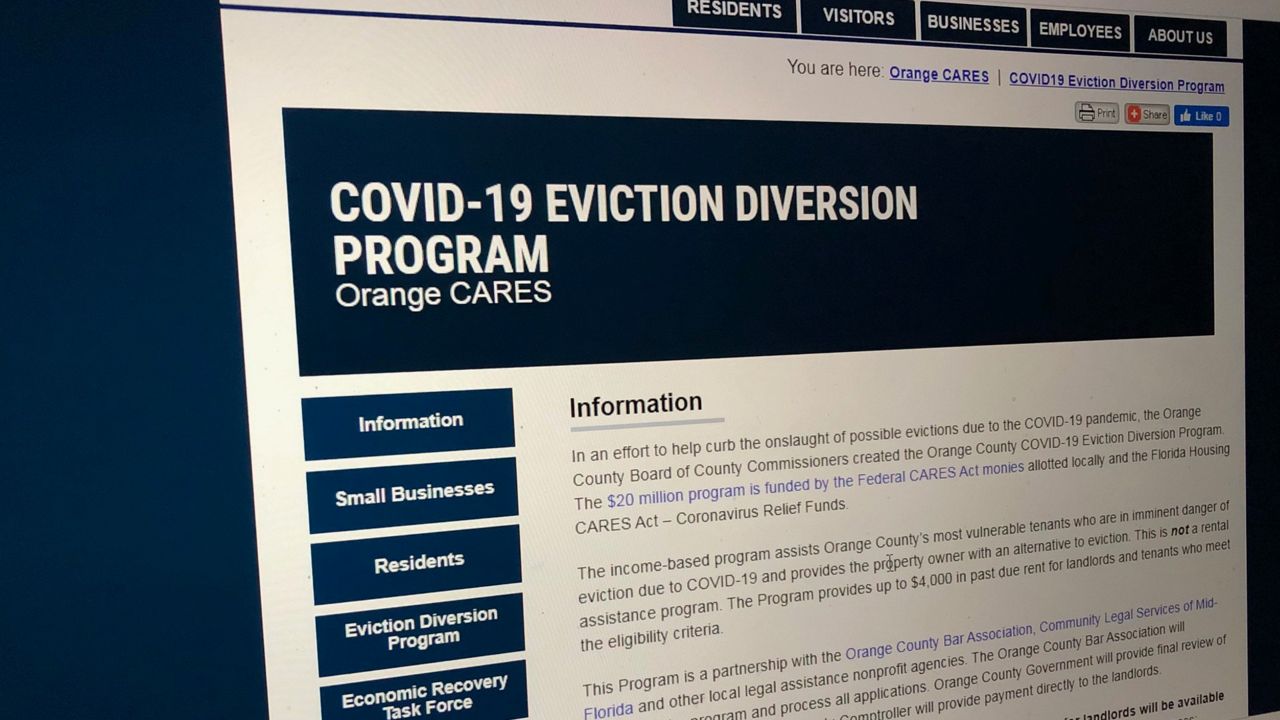This article was updated December 2, 2020 to reflect a change from 19% to 18% in the decrease in November evictions and a change from 18.7% to 18.2% in the decrease in October/November evictions, based on updated data Wednesday from the Orange County Clerk of Courts.
ORLANDO, Fla. — Even amid the economic effects of the coronavirus, filings for evictions in Orange County fell 18.2% in October and November compared with the same period in 2019, according to data from the Orange County Clerk of Courts.
What You Need To Know
- Eviction filings in Orange fell 18.2% in October to November compared with same period in 2019
- Officials tout the Eviction Diversion Program, which aims to help the most vulnerable tenants
- Orlando Mayor Buddy Dyer announces reopening of the city’s COVID-19 rental assistance program
- PREVIOUS STORIES:
As a possible factor, Orange County officials tout the Eviction Diversion Program, which aims to help the county’s most vulnerable tenants through funding from the pandemic-inspired federal CARES Act.
Orange County Mayor Jerry Demings said late Monday that the program has helped nearly 2,000 families stay in their homes, paying out $6.1 million to landlords on behalf of tenants in danger of eviction.
“Think about that — 2,000 (families) that potentially would have been homeless,” Demings said late Monday during a coronavirus news briefing.
In early April, Gov. Ron DeSantis ordered a moratorium on evictions that resulted from the effects of the pandemic. Data from the Orange County Clerk of Courts shows that filings for evictions in the county dropped 68.4% from April through September — including particularly dramatic falls through July — this year compared with the same period last year.
DeSantis allowed the moratorium to expire on October 1, yet Orange County filings for evictions dropped 18.4% in October and 18% in November.
The DeSantis order also applied to mortgage foreclosures. Countywide data for foreclosure filings wasn’t yet available to Spectrum News 13 on Tuesday.
The county’s Eviction Diversion Program provides up to $4,000 in past-due rent for landlords and tenants in imminent danger of eviction. County data shows that the program has paid out an average of $3,129, with an average arrears of three months.
“A lot of people are relying on that to avoid eviction, and that’s kind of stalling some of the evictions that may be in the pipeline,” said Jeffrey Hussey, director of public Interest and litigation at Community Legal Services of Mid-Florida, an Orange County partner in the Eviction Diversion Program. “That’s a good thing that Orange County is doing.”
Hussey pointed out that the program requires participation from both tenants and landlords. Officials are finding that some landlords refuse to participate because they accept only cash payments from tenants, presumably because they don’t want to report income to the Internal Revenue Service, he said.
And some other landlords are refusing to renew leases.
“The landlord says, ‘The heck with it. I just want you out. I’m not renewing your lease,’” Hussey said, “And there’s no protection we have for (tenants) on that.”
Hussey also pointed out that the Centers for Disease Control and Prevention recently established an evictions moratorium that covers tenants from September 4 through December 31.
“The tenant has to be proactive,” Hussey said, adding that tenants must give landlords a document showing COVID as the reason they’re not paying rent.
For the Orange County program, officials emphasized that they must end the application process on December 16 so that they can meet the December 30 deadline for spending all available federal money. Landlords and tenants can find screening and application information on the county’s website.
Also Monday, Orlando Mayor Buddy Dyer announced the reopening of the city’s COVID-19 rental assistance program, which he said has provided almost $700,000 in support to about 220 families.
Orlando has received an additional $950,000 from the state in CARES funding, Dyer said. The prescreening process remains open until December 15 or until funding is used up. Tenants can find screening and application information on the city’s website.
“We’re grateful to have this program to help alleviate the pressure and stress on families,” Dyer said.



